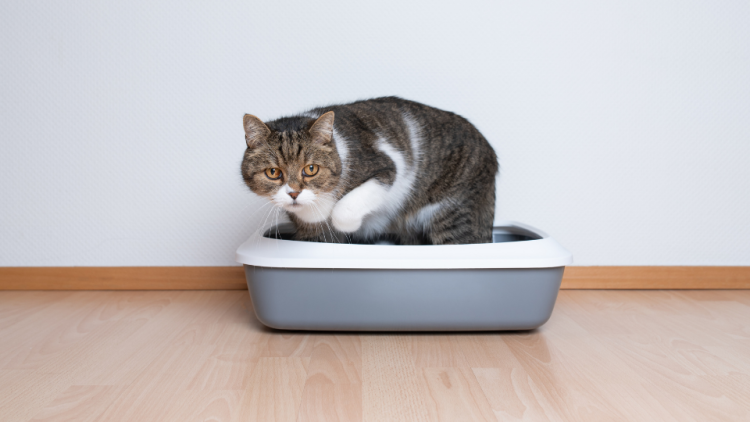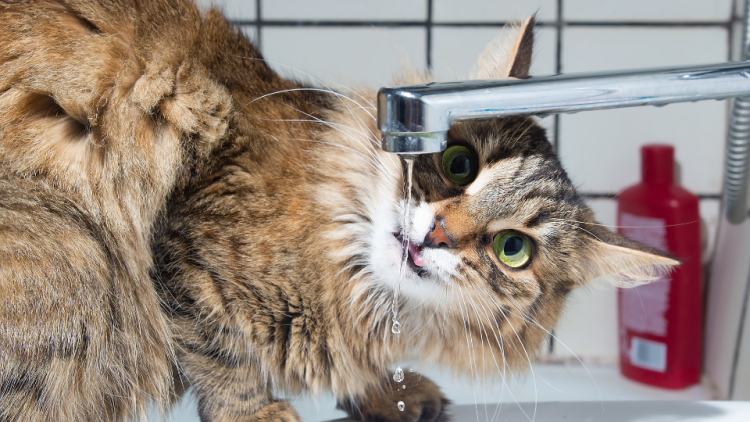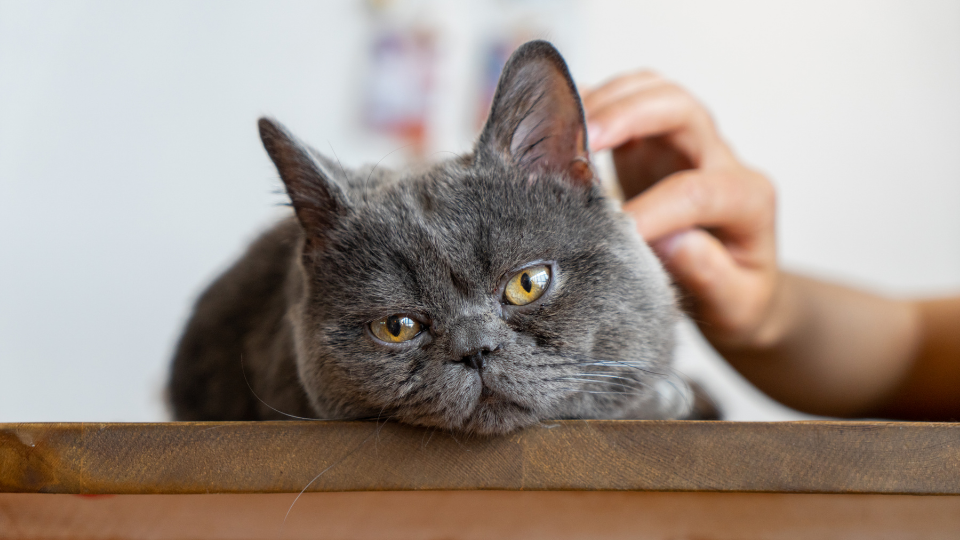Your cat should produce a stool about once a day; if they don’t do so for about 48 to 72 hours, they might be constipated. The most common cause for constipation is dehydration, but it can also be a sign of a more serious health condition.
Read on to learn everything you need to know about constipation in cats, what causes it, how to help treat it, and more.
Table of Contents
- How to tell if your cat is constipated
- What causes constipation in cats?
- What to do if my cat is constipated?
- How to treat constipation in cats
- How to prevent cat constipation
- What about constipation in kittens?
- Key Takeaways
Pro Tip: If you're not sure what's wrong with your pet, don't guess and wait. Compare pet insurance plans and enroll in a policy that gives your cat access to the care it deserves at a rate you can afford.
How to tell if your cat is constipated
In general, healthy cats don’t usually suffer from constipation. The condition is more common in senior cats, obese cats (who can’t groom their hind end), and cats with underlying medical issues.
The main symptoms of constipation in cats include:
- Dry and hard stools
- Not being able to produce stools at all
- Straining or crying in the litter box
- Avoiding the litter box altogether
- Hunched posture
- Tense abdomen
Constipation is often due to an underlying health problem, so you might notice symptoms of other digestive issues. Examples include nausea, vomiting, decreased appetite, weight loss, increased or decreased water intake, increased urination, muscle loss, walking stiffly, and difficulty jumping.
If you notice any of these signs, contact your vet as soon as possible. Cats that haven’t produced a stool in more than 48 to 72 hours should be evaluated by a vet, and the longer you wait to diagnose the problem, the more difficult it may be to treat.
What causes constipation in cats?
If you're wondering "why is my cat constipated?", there are several possible reasons. Common causes of constipation in cats include:
Dehydration
When cats become dehydrated or drink insufficient water, their body will try to absorb more fluid from the colon, leading to harder and drier stools. Chronic kidney disease leads to increased urine production, resulting in dehydration, and may cause constipation in cats, as well.
Chronic diseases
Apart from kidney disease, hyperthyroidism, diabetes, and inflammatory bowel disease (IBD) are other chronic conditions that can cause constipation in cats. Ruptured anal sacs can also make your cat experience pain when defecating and might result in constipation.
Dietary issues
Too little fiber or having too much fiber can cause constipation, so it’s crucial to know which foods cats can eat. Cats who eat primarily dry food diets are also prone to constipation.
Discomfort
Pain (caused by osteoarthritis, for instance) can cause reluctance to defecate and make your cat avoid the litter box. In some cases, pain can be caused by abnormalities in the rectum or colon. Or, your feline friend may have swallowed a foreign object that caused trauma to the lining of the colon as it passed through. Skin conditions around the anus, such as abscesses, can also affect your pet’s bathroom habits.
Obstructions
Obstructions, such as anal gland disorders, narrowed pelvic canal resulting from an injury, prostatic enlargement, and tumors can affect bowel movement. Swallowing a foreign object can also cause an obstruction in the gastrointestinal (GI) tract. In this case, you may notice preliminary symptoms like a sore abdomen and decreased appetite before you notice constipation.
Idiopathic megacolon
According to the American College of Veterinary Surgeons, this is a disease where the colon loses its normal motility and becomes progressively larger. As the disease worsens, cats can lose the ability to defecate altogether.
Litter tray avoidance
Your cat might be reluctant to defecate due to litter tray avoidance. For instance, the litter box may be dirty, located in a noisy place, shared with competing cats, or if they simply don’t like the type of cat litter. Other causes of constipation in cats include:
- Anxiety or stress
- Allergies
- Inflammatory bowel disease
- Nerve problems
- Excessive grooming (leading to extra hair in the GI tract)
- Tangled hair on the buttocks
- Sedentary lifestyle
- Side effects of some medications
- Obesity
- Perianal disease

What to do if my cat is constipated?
Your vet will diagnose your cat with constipation based on physical exam findings and asking you about their medical history, as well as their feeding habits. Because there are so many possible causes of constipation in cats, the vet might need to run multiple diagnostics tests, such as:
- Blood work to check blood sugar, protein level, liver and kidney function, and salt balance, as well as a complete blood count to check the red and white blood cell count.
- Urine test to see how well the kidneys are working.
- Abdominal ultrasound or x-rays to rule out cancer.
- A thyroid value for constipation in older cats over 8 years old.
- Endoscopy to look at the inside of the cat’s colon and/or colonoscopy to retrieve biopsies.
How to treat constipation in cats
For mild cases, your vet can provide instruction on how to relieve constipation in cats with simple changes to the pet’s diet and lifestyle, along with other at-home remedies. However, some cases are more severe and need the attention of a veterinarian.
Before the vet can determine how to treat constipation in cats, he or she will first need to identify the underlying cause for the condition. They will likely provide fluids or an enema for immediate relief. Then, they’ll recommend over-the-counter medications or prescription drugs, such as prokinetics or laxatives, for treatment.
In very severe cases that don’t respond to treatment, your cat might need to be anesthetized to manually remove the feces from the colon (deobstipation). Cat constipation needs to be treated as soon as possible to reduce the risk of permanent damage resulting from prolonged distension of the colon.
If your pet’s constipation is long-term or they suffer from obstipation (the inability to empty their colon on their own), it could lead to an abnormal dilation of the colon, known as a megacolon. If medical management has failed to help with megacolon, you may consider a surgical procedure called subtotal colectomy to remove the non-functioning part of the colon.
How to prevent cat constipation
In some cases, prevent constipation in cats with at-home remedies. Here are some suggestions that can help soothe your pet’s uncomfortable build-up.
Dietary changes
Constipation in cats can often be easily managed and prevented by paying attention to the amount of dietary fiber in their food. You can change to a high fiber diet in canned food (which provides more water) or add fiber to your cat’s diet with canned pumpkin or bran cereal.
You can also purchase veterinary prescription diets from an authorized retailer. If you aren’t sure about the appropriate quantity of fiber your cat needs to consume, consult your vet. Feeding too little or too much can worsen constipation.
Food allergies can also cause constipation in cats. Consider changing the protein source of your pet’s food to reduce inflammation and help restore normal intestinal movement.
Increase water consumption
Constipation symptoms can be relieved and prevented if you ensure that your cat stays well-hydrated during the day. Cats aren’t very good at drinking standing water, so the best way to increase your kitty’s water consumption is by feeding them wet food. You can also try leaving the tap dripping, use a water fountain, or place water bowls in different places around the house to remind your feline friend to drink more.

Increase exercise
Physical activity can promote normal intestinal movement, which helps alleviate constipation. Consider providing cat trees or toys and spending more time playing with them. Physical activity can also help prevent obesity and reduce anxiety, both of which can also cause cat constipation.
Try probiotics and fiber supplements
Probiotics are healthy bacteria that help support healthy intestines by dealing with a microflora imbalance that might be causing problems with stool consistency. Fiber supplements such as Psyllium can help increase the bulk of your pet’s stool, stimulating movement in the intestines to get the stool out. It can also help increase the water content in the stool, making it easier to pass.
However, if you’re thinking about giving your cat supplements, be sure to consult with your vet first. Your vet can help you choose the appropriate remedy and administer the correct dose. This is especially important if your pet is already taking other supplements, on medication, or they have been diagnosed with a health condition.
Add more litter boxes
Cats can be very particular about their litter boxes. As a general rule of thumb, you should always have one extra litter box. Also, consider trying different types of trays and litter to figure out what your cat likes best.
Prognosis and recovery
Given proper medical treatment, most cats recover quickly. Milder cases of constipation in cats are often manageable with dietary changes. However, if the blockage is caused by an illness or bowel obstruction, your pet may require regular veterinary care to keep the underlying problem in check. Your vet might want to examine your cat or perform x-rays every couple of months to ensure their bowels are functioning correctly.
What about constipation in kittens?
Kittens don’t typically defecate every day, so one day without feces in the litter box doesn’t necessarily warrant immediate cause for concern. However, if your kitten hasn’t gone for a few days, it’s a good idea to start monitoring them for constipation.
Besides dehydration and obstruction, heavy intestinal parasite burdens are also a common cause of constipation in kittens. The number of worms in the intestines can be so high that it causes a blockage and prevents the stool from passing.
Kittens who aren’t yet weaned should be stimulated to defecate. Cat mothers do this by licking the kitten’s rectum. However, if the mother is not around, you’ll need to stimulate the kitten’s rectum to pass stool by wiping it on a regular basis.
Pro Tip: Cats should be dewormed regularly to kill any intestinal parasites that might cause blockage and constipation. Pet insurance makes routine pet care more affordable by reimbursing up to 100% of vet costs.
Key Takeaways
- If your cat hasn’t used their litter box for 48 to 72 hours, they might be suffering from constipation.
- The most common symptoms of constipation in cats include hard, small stools, difficulty passing stools and/or straining to defecate, or no stools at all. In some cases, you may notice a lack of appetite and vomiting as well.
- Causes of constipation in cats include dehydration, obstructions, dietary issues, pain or discomfort, and chronic illnesses like cancer or inflammatory bowel disorder (IBD).
- To manage mild cases and prevent cat constipation, make sure to provide your feline friend a high-fiber diet, access to plenty of fresh water, and sufficient exercise.
- If you have any concerns at all about your pet’s bowel movements, be sure to contact your vet. Your vet will examine your cat to determine the cause and recommend treatment for constipation in cats.
